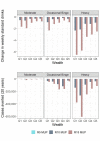Effects of minimum unit pricing for alcohol in South Africa across different drinker groups and wealth quintiles: a modelling study
- PMID: 34373316
- PMCID: PMC8354280
- DOI: 10.1136/bmjopen-2021-052879
Effects of minimum unit pricing for alcohol in South Africa across different drinker groups and wealth quintiles: a modelling study
Abstract
Objectives: To quantify the potential impact of minimum unit pricing (MUP) for alcohol on alcohol consumption, spending and health in South Africa. We provide these estimates disaggregated by different drinker groups and wealth quintiles.
Design: We developed an epidemiological policy appraisal model to estimate the effects of MUP across sex, drinker groups (moderate, occasional binge, heavy) and wealth quintiles. Stakeholder interviews and workshops informed model development and ensured policy relevance.
Setting: South African drinking population aged 15+.
Participants: The population (aged 15+) of South Africa in 2018 stratified by drinking group and wealth quintiles, with a model time horizon of 20 years.
Main outcome measures: Change in standard drinks (SDs) (12 g of ethanol) consumed, weekly spend on alcohol, annual number of cases and deaths for five alcohol-related health conditions (HIV, intentional injury, road injury, liver cirrhosis and breast cancer), reported by drinker groups and wealth quintile.
Results: We estimate an MUP of R10 per SD would lead to an immediate reduction in consumption of 4.40% (-0.93 SD/week) and an increase in spend of 18.09%. The absolute reduction is greatest for heavy drinkers (-1.48 SD/week), followed by occasional binge drinkers (-0.41 SD/week) and moderate drinkers (-0.40 SD/week). Over 20 years, we estimate 20 585 fewer deaths and 9 00 332 cases averted across the five health-modelled harms.Poorer drinkers would see greater impacts from the policy (consumption: -7.75% in the poorest quintile, -3.19% in richest quintile). Among the heavy drinkers, 85% of the cases averted and 86% of the lives saved accrue to the bottom three wealth quintiles.
Conclusions: We estimate that MUP would reduce alcohol consumption in South Africa, improving health outcomes while raising retail and tax revenue. Consumption and harm reductions would be greater in poorer groups.
Keywords: HIV & AIDS; epidemiology; health economics; health policy; public health.
© Author(s) (or their employer(s)) 2021. Re-use permitted under CC BY. Published by BMJ.
Conflict of interest statement
Competing interests: None declared.
Figures
Similar articles
-
Impact of minimum unit pricing on alcohol-related hospital outcomes: systematic review.BMJ Open. 2023 Feb 3;13(2):e065220. doi: 10.1136/bmjopen-2022-065220. BMJ Open. 2023. PMID: 36737089 Free PMC article.
-
Equity impact of minimum unit pricing of alcohol on household health and finances among rich and poor drinkers in South Africa.BMJ Glob Health. 2022 Jan;7(1):e007824. doi: 10.1136/bmjgh-2021-007824. BMJ Glob Health. 2022. PMID: 34992078 Free PMC article.
-
Estimated Effects of Different Alcohol Taxation and Price Policies on Health Inequalities: A Mathematical Modelling Study.PLoS Med. 2016 Feb 23;13(2):e1001963. doi: 10.1371/journal.pmed.1001963. eCollection 2016 Feb. PLoS Med. 2016. PMID: 26905063 Free PMC article.
-
Effects of minimum unit pricing for alcohol on different income and socioeconomic groups: a modelling study.Lancet. 2014 May 10;383(9929):1655-1664. doi: 10.1016/S0140-6736(13)62417-4. Epub 2014 Feb 10. Lancet. 2014. PMID: 24522180 Free PMC article.
-
Potential effects of minimum unit pricing at local authority level on alcohol-attributed harms in North West and North East England: a modelling study.Southampton (UK): NIHR Journals Library; 2021 Mar. Southampton (UK): NIHR Journals Library; 2021 Mar. PMID: 33764725 Free Books & Documents. Review.
Cited by
-
The landscape and level of alcohol policy enforcement in Tanzania.PLOS Glob Public Health. 2024 Dec 2;4(12):e0003203. doi: 10.1371/journal.pgph.0003203. eCollection 2024. PLOS Glob Public Health. 2024. PMID: 39621698 Free PMC article.
-
An agent-based model of binge drinking, inequitable gender norms and their contribution to HIV transmission, with application to South Africa.BMC Infect Dis. 2023 Jul 29;23(1):500. doi: 10.1186/s12879-023-08470-y. BMC Infect Dis. 2023. PMID: 37516819 Free PMC article.
-
Impact of minimum unit pricing on alcohol-related hospital outcomes: systematic review.BMJ Open. 2023 Feb 3;13(2):e065220. doi: 10.1136/bmjopen-2022-065220. BMJ Open. 2023. PMID: 36737089 Free PMC article.
-
Did COVID-19-Related Alcohol Sales Restrictions Reduce Alcohol Consumption? Findings from a National Online Survey in South Africa.Int J Environ Res Public Health. 2022 Feb 19;19(4):2422. doi: 10.3390/ijerph19042422. Int J Environ Res Public Health. 2022. PMID: 35206607 Free PMC article.
-
Equity impact of minimum unit pricing of alcohol on household health and finances among rich and poor drinkers in South Africa.BMJ Glob Health. 2022 Jan;7(1):e007824. doi: 10.1136/bmjgh-2021-007824. BMJ Glob Health. 2022. PMID: 34992078 Free PMC article.
References
-
- Van Walbeek C, Chelwa G. Using price-based interventions to reduce abusive drinking in the Western Cape Province 2019.




